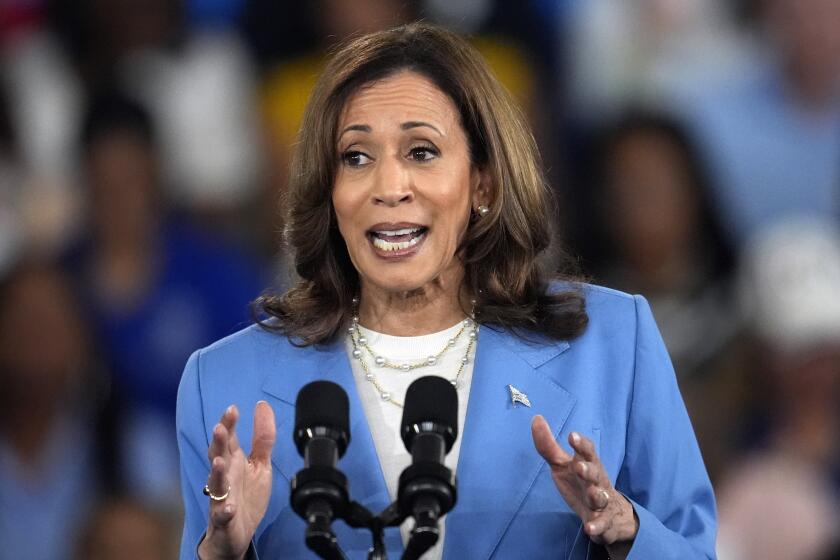A Foul Political Wind Blowing In From Washington
Californians, who already have the dirtiest air in the nation, may have to breathe an extra 2.5 million new cars’ worth of atmospheric pollution by 2007. The state’s fresh extra tonnage of vaporous schmutz would come not from the exhaust-clogged skies of greater Los Angeles, nor from its new air-pollution hubs in the San Joaquin Valley. No, the new increment is rolling in from Washington, D.C., by way of Missouri -- the result of Republican pork-barrel politics on a massive scale.
The prospect of filthier air also raises a new eco-political question: Can states, congressionally speaking, undermine other states’ air-quality regulations in the interest of their industries? If they can, will they be aided and abetted by the executive department that some cynics already call the U.S. Environmental Pollution Agency?
“This is devastating,” said Alan Lloyd, chairman of the California Air Resources Board, which oversees state air-pollution policy. “The message is that special interests anywhere can hold up the public health of children and everyone else who breathes in California.”
What exactly happened in the U.S. Senate last week was that Missouri Republican Sen. Christopher S. Bond successfully attached a rider to a major appropriations bill that would forbid California -- and, in effect, any other state -- to regulate emissions of off-road internal-combustion engines of less than 50 horsepower. This category includes everything from lawn mower and rototiller motors to most off-road motorcycles, powerboats, generators, stationary pump engines and a high proportion of industrial, agricultural and construction power plants. These devices constitute the largest remaining source of unfettered gas-burning air pollution in California.
The House has not considered the rider but is expected to go along with the Senate version.
Bond claimed that the costs of modifying the motors to conform to California regulations would force closure of two small-engine plants in his home state that belong to Briggs & Stratton, the largest U.S. manufacturer of such engines. The company spent $520,000 lobbying for the pro-pollution amendment. (Bond later raised his rhetorical ante on the Senate floor, claiming that 22,000 jobs in 23 states would travel abroad if his rider were not adopted.)
Interestingly, in a September filing with the Securities and Exchange Commission, Briggs & Stratton said it would suffer no harm from the California regulations. The filing was cited by California Sen. Dianne Feinstein, who, along with California Sen. Barbara Boxer, led the Democrats in the floor fight.
“They are either lying to us or the SEC,” one Senate staffer commented.
“Clearly, this is a blow to our pollution control programs, particularly in Los Angeles,” said Jerry Martin, spokesman for the Air Resources Board.
He pointed out that the federal EPA is demanding that Southern California either reduce its air pollution by more than 50% by 2010 or forfeit $8 billion in highway funding. The state still has no idea how to fulfill one-third of this requirement and now must factor in the huge increment of small-engine pollution it had hoped to phase out by 2007. The Bond rider would also obstruct the clean-air plans of other states with similar regulations, among them Connecticut, New York, Massachusetts and even President Bush’s home state of Texas.
Some environmentally minded observers speculate that the administration may have played a role in undoing California’s regulations. The EPA has definitely been weighing in behind polluters in many recent cases. For example, it rolled back national power-plant emission-quality standards on upgraded older facilities. In California, the U.S. Justice Department filed an amicus curiae brief in favor of diesel-engine manufacturers that have sued to lift the South Coast Air Quality Management District’s large-engine emission requirements.
Ironically, if unfortunately, the Bond rider, if it becomes law, would place the entire small-engine pollution issue in the increasingly slippery hands of the EPA. It asks that the federal agency formulate new small-engine emission rules by December 2004. But as Martin, whose California agency has long set the national standard for air-pollution laws, put it, “For a long time now, the EPA has been best known for not doing things on time and not coming up with effective rules.”
Frank O’Donnell of the Clean Air Trust, a Washington lobbying group, said he was disappointed that Feinstein accepted a last-minute 50-horsepower compromise of the original rider that would have banned California’s regulation of any off-road engine under 175 horsepower. The change, he said, represented as little as 10% of the state’s polluting motors.
A Feinstein spokesman countered, “This was better than nothing.”
Yes, but why was that ever the choice?
More to Read
Get the L.A. Times Politics newsletter
Deeply reported insights into legislation, politics and policy from Sacramento, Washington and beyond. In your inbox three times per week.
You may occasionally receive promotional content from the Los Angeles Times.










